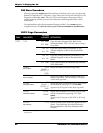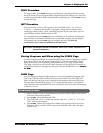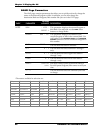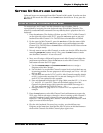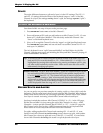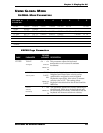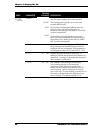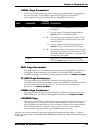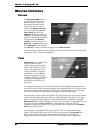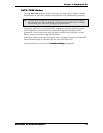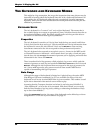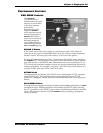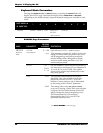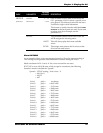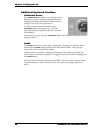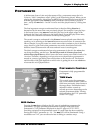
Chapter 2: Playing the A6
52 ANDROMEDA A6 REFERENCE MANUAL
MASTER CONTROLS
VOLUME
The MASTER VOLUME knob is a
global (affects the A6 in all
modes) volume control that
determines the final output
level of the unit. To use an
audio term,
MASTER VOLUME is
post (comes after) the
PRE and
POST FILTER mixes and the
VOICE MIX. This means that any
relative level settings you make
within the Programs and Mixes
are preserved. The
MASTER
VOLUME
is routed to the unit’s
MAIN LEFT and RIGHT stereo outs,
the
HEADPHONE output and the
two
AUX OUTs. It does not affect the eight stereo VOICE OUTPUTS.
You operate this control by simply turning it: fully counter-clockwise shuts the audio
outputs off, fully clockwise is maximum.
TUNE
MASTER TUNE is also global and
is used to tune the A6 to
another instrument or tuning
device. This control is post (or
“after”) the frequency of the
VCOs and Filters, Transpose
and Detune. So any relative
frequency settings you make
within the Programs and Mixes,
or global pitch changes such
transpose or pitch bend, are
preserved.
You operate this control by turning it to the left or right of center. Setting this knob
near the 12 o’clock center position tunes the A6 to standard pitch. You will know that
the knob is at 0 when the associated LED lights. Turning the knob to the left causes
the A6 to tune flat; turning the knob to the right causes it to tune sharp.
Adjusting this control displays the global
TUNE page where more precise and custom
control over the global tuning can be made. When displayed, the global
TUNE page
shows the precise tuning frequency in hundredths of Hz. In addition to using the
MASTER TUNE knob to adjust tuning, you can also use soft knob 1 when global TUNE is
displayed as well as the ▲ and ▼ buttons. And remember, when the
MASTER
parameter is selected in global TUNE, pressing both arrows together resets MASTER
TUNE
to precisely 440.00.
Also included on the global
TUNE page is the BKTUNE or “background tuning”
option. Use soft knob
2 to turn it on or off. After you perform an AUTO TUNE (next
topic), background tuning will continuously monitor the VCOs and make
adjustments as they are needed. (The VCFs are not tuned in the background.)



